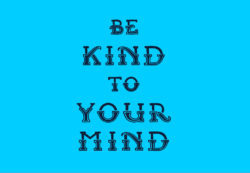MENTAL HEALTH AND SELF CARE
Self-care is a big buzz concept in the world of healing and wellness. It is certainly a legitimate and necessary practice and one that warrants dedication and daily attention. However, we must recognize that self-care is not only initiated with external behaviors such as salt baths, working out, yoga, body work, music or art expression, friend and family time and connection with nature but holistic self-care is the balance between healthy internal and external processes.
Two of the best ways of managing internal self-care is being kind to your mind and keeping your thoughts on safe ground.
It is amazing how easy it is to feed the inner critic and the inner bully. Some of the most outrageous standards we hold and the worst judgments we cast are on ourselves. Our mind needs us to be supportive, not punitive or coercive.
At various points in our development, most of us carry deeply rooted stories of guilt, shame, low self-worth and self-esteem. As we ‘reparent’ ourselves we must be the positive and encouraging voice we needed/need to hear.
The viscous cycle of negative self-talk creates stagnation, paralysis and self-sabotage and that makes moving forward an arduous task…and one that is, unfortunately, most easily given up on. Stay the course of growth and be kind to your mind. Being kind to our mind encourages us to consciously redirect our thoughts to healthier places. We wouldn’t walk into a dark alley or unsafe neighborhood so why would we subject our mental and emotional state to unsafe thinking places?
Here are just a few phrases that can be helpful in preventing conditioned and harmful ruminating:
– Is this thought helping me or hurting me?
– Would I feel better without this thought?
– Is this thought coming from “old brain” (conditioning) or “new brain (conscious rebuilding of life)?
– Is this thought growth oriented?
– Is this thought 100% true? (I love Brene Brown’s work)
– How can I make this thought kinder or more safe?
Mindfulness requires a different kind of diligence and commitment. Retraining the brain for healthy thoughts, emotions and behaviors takes time, particularly when we are unwinding patterns that have been governing our experiences, relationships and sense of identity for most of our life.
